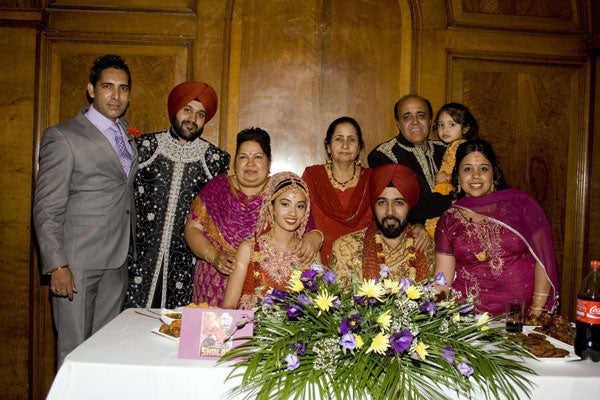Last Night's Television: The Family, Channel 4<br />The Rules of Film Noir, BBC2

If you're beginning to get Christmas ground-rush (realising that you haven't pulled the ripcord early enough to prevent a hard landing) just be thankful that you're not having to organise an Indian wedding, a social event that involves more pre-planning than a trip to the Moon.
And if you are planning an Indian wedding you have my sympathy, and, I imagine, that of anyone who's been watching The Family for the last eight weeks. Sunny and Shay's wedding has been something of a running theme in this warmly engaging series – the very first episode revealing that even sending out the invitations is dauntingly a labour-intensive affair. The question of whether Shay's estranged mother would actually attend the celebrations has also been inextricably stitched into the recent lives of the Grewal family – a dependable cliffhanger that this week delivered the anti-climactic but sadly realistic payoff. In a movie, mum would have pitched up at the party at the last minute for a tearful reconciliation, complete with Bollywood dance number. In life, we got the tears – from a young bride who hoped to the very end – but maternal pride stupidly won out. Will the folly be so great that she doesn't even watch on screen? If so, she'll have missed something lovely, both as a mother and a television viewer.
The final episode began with comic misdirection, Arvinder's voice issuing instructions to his long-suffering wife, Sarbjit. "Do it at the bottom," he said, followed by a long ambiguous moan. Then, "It's swollen", and another ecstatic groan. The camera cut to a close-up of the three wise monkeys on the bedroom window, paws clasped to eyes, mouths and ears, and then we got the reveal, which was nothing more erotic than a massage for a bad back. The three wise monkeys, incidentally, played very little part in the programme at any other point, since the central idea of the format was that we should see and hear everything, both good and bad. And one of the reasons this particular series has been so delightful is that, although the bad hasn't been entirely absent – with serious illness and marital rows – the good has so effortlessly surmounted it. The intensely romantic connection between Sunny and Shay has been a major part of that, and so it seemed fitting that the final programme should be almost entirely built around their wedding and its elaborate rituals.
Part of the pleasure of the thing has been the natural intermingling of the routines of British life with traditions and customs that have only recently taken root here, perhaps best exemplified by Sunny's description of one of the post-marriage ceremony rituals, when the groom visits the bride's parental home, to be amiably barracked by her relatives: "We're just waiting for the handover now, for the goods..." he said. "If this were you in Ikea, I guess this would be the collection point... you've got the receipt and you've got the numbers and you're just waiting for 'here you go, mate'." Earlier, he had compared the pleasures of fully licensed intimacy with his wife to driving a Ferrari that had all its paperwork up to date. Sensibly he – or the production team – had declined to show us the couple pulling out of the driveway, leaving the last few minutes of the series for the long-delayed return of Kaki and Jeet's baby, an event that very nearly made Sarbjit dissolve with happiness. "Everyone's going to live happy ever after," she said. I imagine it'll be a bit more complicated than that, but I do hope she's right.
Matthew Sweet's The Rules of Film Noir, setting up a season of noir films on BBC2, was a real treat for buffs, full of apposite clips from classic noirs and distinguished talking heads, including Paul Schrader and the cinematographer Roger Deakins, who beautifully keyed up a long sequence from Sweet Smell of Success. Sweet himself crisply itemised the essential components of this counter-intuitive cultural moment – a group of Hollywood movies that essentially set out to make the filmgoer feel worse about America (and human beings in general) than they had when they entered the cinema. And the director, Elaine Donnelly Pieper, had reconstructed the tropes of film noir – backlit steam and raking shadows – so lovingly that you couldn't always immediately tell when a clip had given way to a piece to camera. Novice students may have remained baffled by one conundrum though. How come a resolutely American art form, hugely influenced by German émigrés, ended up with a French name? It was because noir – the concept – was entirely retrospective and owed its existence to the enthusiasms of Parisian cineastes. To paraphrase one of Sweet's rules – "See America through a stranger's eyes" – they taught us to see Hollywood through French eyes.
Subscribe to Independent Premium to bookmark this article
Want to bookmark your favourite articles and stories to read or reference later? Start your Independent Premium subscription today.

Join our commenting forum
Join thought-provoking conversations, follow other Independent readers and see their replies